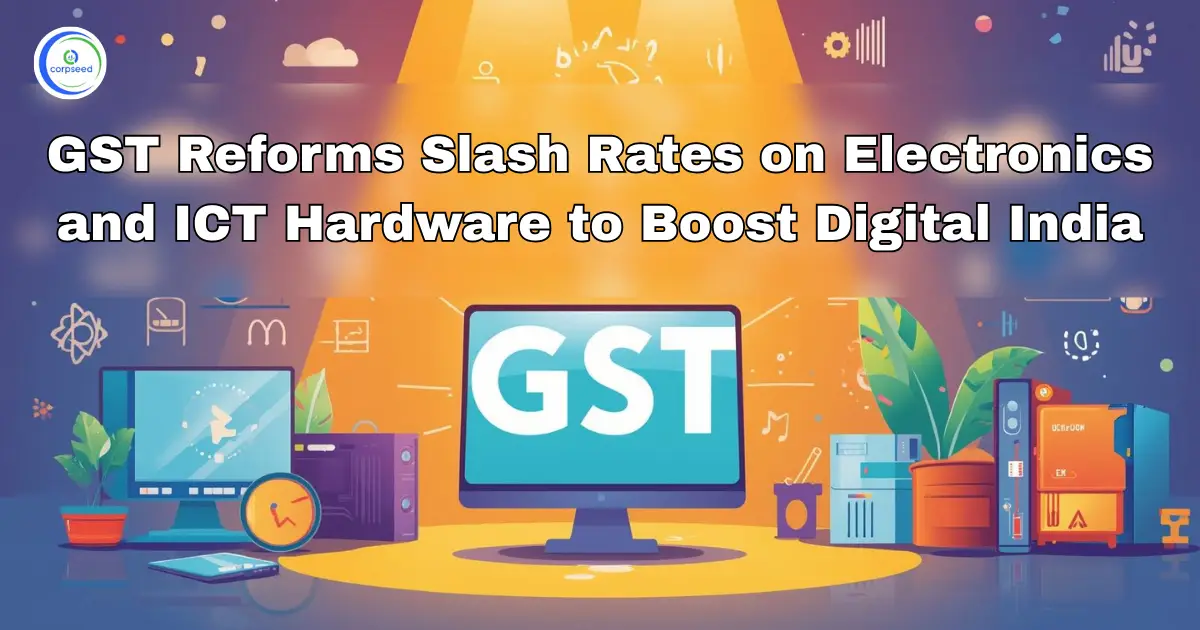The Government of India has introduced Next-Gen reforms in the Goods and Services Tax (GST) to make electronics and ITC hardware affordable for consumers and promote domestic manufacturing, increase jobs, and support India's digital economy. This reform will directly benefit households, MSMEs, start-ups, and the electronics world under the Ministry of Electronics and Information Technology (MeitY).
GST Cuts to Drive Domestic Electronics Manufacturing
The GST rate on air conditioners, dishwashers, and large-screen televisions (LCD and LED) has been reduced from 28% to 18%. This move will not only lower prices for households but also expand demand for these products. With higher demand, the domestic electronics industry will benefit through stronger backwards linkages in components such as compressors, displays, semiconductors, plastics, wiring, LED panels, and assembly services.
For MSMEs and start-ups, this is a big push as it will reduce import dependency, promote localisation, and generate more opportunities in the supply chain. The GST cut on dishwashers is also expected to improve ease of living for households, further boosting the adoption of modern appliances.
Affordable ICT Hardware for Education and Start-Ups
The GST rate on monitors and projectors (non-TV) has been reduced from 28% to 18%, bringing down costs for schools, colleges, offices, and digital learning centres. Affordable ICT hardware will play a key role in expanding digital education and supporting the IT sector, as well as India’s growing start-up ecosystem.
Similarly, the GST on electric accumulators (non-Li-ion, including power banks) has been cut from 28% to 18%. This will make backup power and energy storage solutions more affordable, encouraging efficient use of digital devices in homes and workplaces. By improving accessibility to affordable ICT hardware, these reforms will directly advance the goals of Digital India and Aatmanirbhar Bharat.
Strengthening Security and Defence Infrastructure
In addition to consumer and ICT products, the GST reforms have also focused on strengthening internal security. The GST on two-way radios (walkie-talkies) has been reduced from 12% to 5%, lowering procurement costs for police forces, paramilitary units, and defence organisations. This step will enhance communication systems for security agencies while reducing the financial burden on government departments.
Promoting Renewable Energy and Sustainability
The reforms extend beyond electronics to renewable energy and sustainable solutions. The GST on renewable energy devices and solar photovoltaic cells has been reduced from 12% to 5%, making solar energy more affordable for households and industries.
Additionally, composting machines will now attract GST at 5% instead of 12%, encouraging waste-to-energy practices and composting technologies. This will support the development of smart cities and promote India’s shift towards sustainable and green living.
A Push for Jobs, Localisation, and Global Value Chains
These next-gen GST reforms are expected to create significant positive impacts across India’s electronics and technology ecosystem. Lower GST rates will make products more affordable, boost demand, and generate new employment opportunities. By supporting MSMEs, start-ups, and domestic manufacturers, the reforms will strengthen localisation and reduce reliance on imports.
At the same time, India will move closer towards integration with global value chains, making the country a stronger hub for electronics manufacturing and ICT hardware.
With GST cuts across electronics, ICT hardware, renewable energy, and sustainable solutions, India has taken a major step to promote affordability, localisation, and digital growth. These reforms align with the vision of Digital India, Aatmanirbhar Bharat, and sustainable development, while creating opportunities for businesses and citizens alike.
This portion of the site is for informational purposes only. The content is not legal advice. The statements and opinions are the expression of author, not corpseed, and have not been evaluated by corpseed for accuracy, completeness, or changes in the law.

